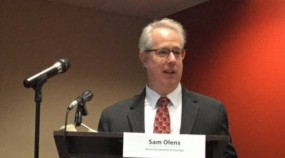The FTC wrapped up its three city Debt Dialogue tour in Atlanta, Georgia yesterday afternoon with very animated “dialogues” among regulators and representatives of the credit and collections industry. Georgia’s Attorney General Samuel Scott “Sam” Olens welcomed a packed room of attendees to the third debt dialogue and signaled the importance of regulatory coordination among state and federal law enforcers.

Georgia Attorney General Sam Olens opens 3rd Debt Dialogue
Attorney General Olens applauded the FTC on Operation Collection Protection and confirmed Georgia’s support for the initiative. The warm introduction was followed by a panel comprised of the Federal Trade Commission (FTC), ACA International Board Member Nick Jarman, and three state regulators: Carri Gruge Lybarker, from South Carolina’s Department of Consumer Affairs; Olha Rybakoff, Senior Counsel in the Tennessee Attorney General’s Office; and John Sours, the Director of Georgia’s Consumer Protection Unit (now part of the Attorney General’s office).
The FTC’s Cindy Liebes, coordinating the first panel, covered many topics in discussions about rogue, fraudulent, and legitimate debt collectors. The panelists, including ACA Board Member Nick Jarman, reviewed complaint data related to debt collection activity, noting how few complaints are actually generated given the millions – possibly billions – of contacts debt collectors have with consumers annually (fewer than five percent of accounts in collections).
Several of the state regulators noted that debt collection complaints are not necessarily the most prevalent complaints they receive, and may be on the decline. John Sours, Georgia’s Director of Consumer Protection, told attendees that the number of complaints is not necessarily a good indicator of good or bad conduct and emphasized that good companies may have one or many rogue collectors – what is critical is that they monitor the conduct of their employees and take appropriate action when improper conduct is detected.

Atlanta Debt Dialogue Panel 1
The message was that it is both the state and federal regulators’ expectation that debt collection agencies must be responsive both to consumer complaints and disputes as well as to regulatory inquiries and that considerable attention would be paid not only to whether debt collectors have appropriate compliance documentation, but to whether or not they have trained it out, monitor it, and take meaningful corrective action when individual collectors fail to follow compliance policies.
South Carolina’s Lybarker emphasized that a critical way for consumers to distinguish legitimate from fraudulent debt collectors is whether or not a debt collector is willing and able to substantiate the debt it may be attempting to collect. All the state regulators, in harmony with the FTC’s Liebes, indicated disappointment for recurring unanswered complaints or agencies that do not take effective corrective action against bad actors. Each made the point that in an investigation each will look to see what an agency actually does to foster a compliant environment – not just develop policies that are not truly a part of the agency’s operations.
The second panel included Debt Dialogue regulars Chris Koegel, Assistant Director, FTC Division of Financial Practices, and Greg Nodler, Senior Counsel for Enforcement Policy & Strategy, CFPB; who were joined by Kenneth Lennon, Assistant Director of the Community and Consumer Law Division of the Office of the Comptroller of the Currency. Industry representatives included Harvey Moore, NARCA’s new President and President of The Moore Law Group; DBA representative and Chief Compliance Officer of Security Credit Services, LLC, Brett Soldevila; and Tim Bauer, President of insideARM and co-Executive Director of the Consumer Relations Consortium.

Atlanta Debt Dialogue Panel 2
An issue initially raised by Bauer – the barriers to communication between consumers and debt collectors – led to a spirited discussion with the entire panel. On the consumer side, there is a tremendous (and justifiable) fear of criminals and thieves posing as debt collectors. From the debt collector side, technology (such as caller ID, voice messaging services, and smart phones), inconsistent laws, and, to no one’s surprise, the TCPA, are all limiting communication between the parties. This led the FTC’s Kane to ask Bauer to talk about a publication released yesterday from the non-profit group, Consumer Action, entitled “When a collector calls: An insider’s guide to responding to debt collectors.” Bauer explained that the publication was produced by Consumer Action in partnership with the Consumer Relations Consortium, and is an excellent example of what can happen when consumer groups and collectors have open and honest dialogue.
On the theme of unintended consequences that overregulation of debt collection could yield, the OCC’s Kenneth Lennon engaged in a lively dialogue with DBA International’s Brett Soldevila regarding the OCC’s Bulletins on debt sales and vendor management. Soldevila acknowledged that in developing its certification standards DBA adopted a number of the standards in the OCC bulletin. He did take issue with a matter in the OCC vendor management bulletin, but indicated that DBA is engaged in discussions with the OCC regarding the roles and responsibilities of a debt seller and debt buyer post-closing a debt sale.
Following this exchange, a friendly debate between NARCA President Harvey Moore and the FTC’s Chris Koegel focused on issues related to whether or not the system of debt collection is broken – and what alternatives may be available in the debt collection process for encouraging consumers to communicate with collectors to resolve outstanding accounts. They took differing positions on whether or not the laws and regulations related to debt collection are clear and whether an absence of clarity leads to ambiguity.
Industry representatives from both NARCA and DBA indicated that more clarity on how to communicate with consumers is needed. The CFPB’s Greg Nodler, speaking for himself, stated that he believes the debt collection laws are clear and that, for example, in regard to leaving messages, Nodler feels the Foti decision is clear. NARCA’s Moore indicated that some of the complexity of applying laws that were enacted before current technology evolved may create opportunities for unnecessary and costly litigation.
Although FTC’s Koegel opened the third and final Debt Dialogue acknowledging that debt collection plays a critical role in our economy, he later emphasized “where there is a need to communicate with consumers there should be a pathway” but that “nothing in the legal and regulatory scheme obligates consumers to communicate with debt collectors.”
NARCA’s Moore reported that only two percent of all messages left for consumers result in a call back. In reply FTC’s Koegel questioned why collectors would then leave messages at all if they prove ineffective in generating a response. FTC’s Koegel encouraged debt collectors to explore other means for communicating with consumers that may be more consumer-driven.
As in past Debt Dialogues, the regulators were asked to review some recent enforcement examples. The FTC and CFPB agreed that there are too few resources to pursue all possible actions so Operation Collection Protection and coordination with other agencies is critical to pick actions strategically, to foster deterrence of harmful conduct, and to encourage remediation. All of the state and federal regulators were supportive of the industry trade associations’ actions to self-regulate and drew the Debt Dialogue to a close.




![Photo of Leslie Bender [Image by creator from ]](/media/images/Leslie_Bender.2e16d0ba.fill-500x500.jpg)
![the word regulation in a stylized dictionary [Image by creator from ]](/media/images/Credit_Report_Disputes.max-80x80.png)
![Cover image for New Agent Onboarding Manuals resource [Image by creator from insideARM]](/media/images/New_Agent_Onboarding_Manuals.max-80x80_3iYA1XV.png)


![[Image by creator from ]](/media/images/New_site_WPWebinar_covers_800_x_800_px.max-80x80.png)
![[Image by creator from ]](/media/images/Finvi_Tech_Trends_Whitepaper.max-80x80.png)
![[Image by creator from ]](/media/images/Collections_Staffing_Full_Cover_Thumbnail.max-80x80.jpg)
![Report cover reads One Conversation Multiple Channels AI-powered Multichannel Outreach from Skit.ai [Image by creator from ]](/media/images/Skit.ai_Landing_Page__Whitepaper_.max-80x80.png)
![Report cover reads Bad Debt Rising New ebook Finvi [Image by creator from ]](/media/images/Finvi_Bad_Debt_Rising_WP.max-80x80.png)
![Report cover reads Seizing the Opportunity in Uncertain Times: The Third-Party Collections Industry in 2023 by TransUnion, prepared by datos insights [Image by creator from ]](/media/images/TU_Survey_Report_12-23_Cover.max-80x80.png)
![Webinar graphic reads RA Compliance Corner - Managing the Mental Strain of Compliance 12-4-24 2pm ET [Image by creator from ]](/media/images/12.4.24_RA_Webinar_Landing_Page.max-80x80.png)